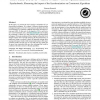Free Online Productivity Tools
i2Speak
i2Symbol
i2OCR
iTex2Img
iWeb2Print
iWeb2Shot
i2Type
iPdf2Split
iPdf2Merge
i2Bopomofo
i2Arabic
i2Style
i2Image
i2PDF
iLatex2Rtf
Sci2ools
PPOPP
2015
ACM
2015
ACM
More than you ever wanted to know about synchronization: synchrobench, measuring the impact of the synchronization on concurrent
In this paper, we present the most extensive comparison of synchronization techniques. We evaluate 5 different synchronization techniques through a series of 31 data structure algorithms from the recent literature on 3 multicore platforms from Intel, Sun Microsystems and AMD. To this end, we developed in C/C++ and Java a new micro-benchmark suite, called Synchrobench, hence helping the community evaluate new data structures and synchronization techniques. The main conclusion of this evaluation is threefold: (i) although compare-and-swap helps achieving the best performance on multicores, doing so correctly is hard; (ii) optimistic locking offers varying performance results while transactional memory offers more consistent results; and (iii) copy-on-write and read-copy-update suffer more from contention than any other technique but could be combined with others to derive efficient algorithms.
| Added | 16 Apr 2016 |
| Updated | 16 Apr 2016 |
| Type | Journal |
| Year | 2015 |
| Where | PPOPP |
| Authors | Vincent Gramoli |
Comments (0)

